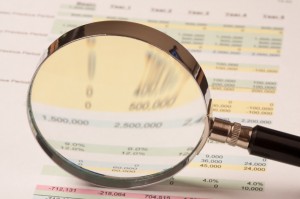Credit Score – Where the numbers come from?
Posted by : Premraj | Posted on : Tuesday, August 11, 2009

You’re driving and you happen to pass by one of those suburbs just to avoid traffic. You see a house with a for sale sign on the lawn. You’re just dying to own a house and have been thinking a lot about leaving your apartment. You finally decide that you want to get it, so you look to some financial institutions to provide financing opportunities like loans or mortgages to help you in the purchase. There’s one big catch though: you don’t have a high enough credit score…
A credit score is a term that’s probably not new to you, but the idea of getting a high one is often difficult to understand. Rates on loans are mainly based on how good your credit score is and your ability to pay your obligations. Banks or lenders view your scores all the time, and having a good score is the only way to get financed for much of anything. Thus, the higher your score, the greater your financing options can be, both in terms of availability and rates.
The credit score was developed by the Fair Isaac Corporation (FICO) as a credit model representing how well a person handles his/her finances. The score is computed by determining an individual’s credit payment history, and each punctual payment causes a rise in a person’s credit score. The time of payments is a huge chunk of the final credit score. Credit history length and types of credits used are also factors in a person‘s score. Negative factors that pull down your overall credit scores are payment default and bankrupt history.
How to get or maintain a good credit score
Payment history is 35% of your credit score. Make timely payments on any loans that you have. Payments which are delayed or defaulted pull down your credit score significantly. It is important that you maintain good standings with your creditors and have good personal finance discipline so that your score isn’t affected by poor payment history.
Your amount of debt represents 30% of the score. If you really want to get a good credit score pay off your existing loans and debts ahead of time. If you have an existing loan on your car, for example, the amount of debt from that vehicle is counted as part of your income and properties. The sooner you pay it off, the better your credit score will look.
Length of credit history is 15% of your score. It is not enough that you have no outstanding payments, but you should also show that you’ve been borrowing money for a long time and have good standings with your creditors. This might seem like a catch 22 because you have to pay stuff off early while still maintaining some time on it, but you really have to have both to keep up your score. A lot of financing won’t show up as a score until you’ve had it for over a year, so perhaps the best option is to make regular payments for at least 12 months and then pay off things early. A personal finance management system can help you keep track of your finances so that you can figure out how much extra money you can allot for future payments.
Recent credit history represents 10%. Lenders will look at transactions that you’ve made in the recent past as an indication of your current financial situation. That’s why it’s always important to keep up with your payments because a few missed ones could mess up your credit score at any time. At the same time, bad credit history may be offset if a person shows that he has significantly made improvements in payment of credit. Use that as a chance to redeem yourself.
Analysis of borrowers credit makes up 10% of the score. This comes from a mix of credit that the borrower holds, such as leases, mortgage, car loans, installments and credit cards. Having a variety of sources will improve your credit overall.
Final thoughts
To get the best deals on much of anything, it’s important that you maintain a good credit score. With this simple breakdown of what makes up a credit score, you already have a good idea on where your credit score stands. Budget tools are available for keeping track of expenses. One thing to note though is that opening multiple applications could also pull down you credit score, so be sure that before you apply for something, you have a rough idea of your chances for financing. If you get several no’s in a row, you’ll severely decrease your chances for financing, so avoid a credit pull when you can. Know the banks rates and compare which one gives the best deal.
Before making any big decisions such as purchasing a car and getting that house you’ve always dreamt of, prioritize which is more important. Online budget planner’s are available to help you figure out which one you might be able to afford, but only you can determine which one you really want. Both require long term commitments and affect your credit score. Having an existing car loan pulls down your credit score because it affects your paying power or debt to income ratio. Inquiries on car dealerships generate credit inquiries and also affect your credit rating. Maintaining a good credit score gives you the option of getting the best deals in the market. But the best thing about maintaining that good credit score is gives you financial maturity and makes life a little bit easier.
 SU
SU REDDIT
REDDIT







